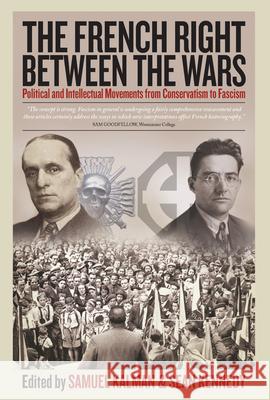The French Right Between the Wars: Political and Intellectual Movements from Conservatism to Fascism » książka
The French Right Between the Wars: Political and Intellectual Movements from Conservatism to Fascism
ISBN-13: 9781785330407 / Angielski / Miękka / 2015 / 274 str.
The French Right Between the Wars: Political and Intellectual Movements from Conservatism to Fascism
ISBN-13: 9781785330407 / Angielski / Miękka / 2015 / 274 str.
(netto: 130,37 VAT: 5%)
Najniższa cena z 30 dni: 135,22
ok. 30 dni roboczych.
Darmowa dostawa!
"Organized thematically into three sections and concluding with William Irvine's astute historiographical commentary, this edited volume unhinges analyses of the French political and intellectual Right from long-standing debates over whether France was "immune" tof ascism, and how to categorize its Rightist leagues... Highly recommended." - Choice " These essays] make useful contributions. They all identify interesting problems, often fresh and original; display significant research; and are clearly written." - Robert O. Paxton, Columbia University "All of the chapters positively contribute to demonstrating the historiographical changes in our understanding of the French right. The concept is strong. Fascism in general is undergoing a fairly comprehensive reassessment and these articles certainly address the ways in which new interpretations affect French historiography." - Sam Goodfellow, Westminster College During the interwar years France experienced severe political polarization. At the time many observers, particularly on the left, feared that the French right had embraced fascism, generating a fierce debate that has engaged scholars for decades, but has also obscured critical changes in French society and culture during the 1920s and 1930s. This collection of essays shifts the focus away from long-standing controversies in order to examine various elements of the French right, from writers to politicians, social workers to street fighters, in their broader social, cultural, and political contexts. It offers a wide-ranging reassessment of the structures, mentalities, and significance of various conservative and extremist organizations, deepening our understanding of French and European history in a troubled yet fascinating era. Samuel Kalman is Associate Professor at St. Francis Xavier University. He is the author of French Colonial Fascism: The Extreme Right in Algeria, 1919-1939 (Palgrave, 2013), The Extreme Right in Interwar France: The Faisceau and the Croix de Feu (Asghate, 2008), numerous book chapters and journal articles, and editor of the 2010 special issue of the journal Historical Reflections/Reflexions historiques devoted to the theme of colonial violence. Sean Kennedy is Professor of History at the University of New Brunswick. He is the author of Reconciling France against Democracy: The Croix de Feu and the Parti Social Francais, 1927-1945 (McGill-Queen's University Press, 2007), The Shock of War: Civilian Experiences, 1937-1945 (University of Toronto Press, 2011), and several scholarly articles.
"Organized thematically into three sections and concluding with William Irvines astute historiographical commentary, this edited volume unhinges analyses of the French political and intellectual Right from long-standing debates over whether France was "immune" tof ascism, and how to categorize its Rightist leagues... Highly recommended." · Choice"[These essays] make useful contributions. They all identify interesting problems, often fresh and original; display significant research; and are clearly written." · Robert O. Paxton, Columbia University"All of the chapters positively contribute to demonstrating the historiographical changes in our understanding of the French right. The concept is strong. Fascism in general is undergoing a fairly comprehensive reassessment and these articles certainly address the ways in which new interpretations affect French historiography." · Sam Goodfellow, Westminster CollegeDuring the interwar years France experienced severe political polarization. At the time many observers, particularly on the left, feared that the French right had embraced fascism, generating a fierce debate that has engaged scholars for decades, but has also obscured critical changes in French society and culture during the 1920s and 1930s. This collection of essays shifts the focus away from long-standing controversies in order to examine various elements of the French right, from writers to politicians, social workers to street fighters, in their broader social, cultural, and political contexts. It offers a wide-ranging reassessment of the structures, mentalities, and significance of various conservative and extremist organizations, deepening our understanding of French and European history in a troubled yet fascinating era.Samuel Kalman is Associate Professor at St. Francis Xavier University. He is the author of French Colonial Fascism: The Extreme Right in Algeria, 1919-1939 (Palgrave, 2013), The Extreme Right in Interwar France: The Faisceau and the Croix de Feu (Asghate, 2008), numerous book chapters and journal articles, and editor of the 2010 special issue of the journal Historical Reflections/Réflexions historiques devoted to the theme of colonial violence.Sean Kennedy is Professor of History at the University of New Brunswick. He is the author of Reconciling France against Democracy: The Croix de Feu and the Parti Social Français, 1927-1945 (McGill-Queens University Press, 2007), The Shock of War: Civilian Experiences, 1937-1945 (University of Toronto Press, 2011), and several scholarly articles.











